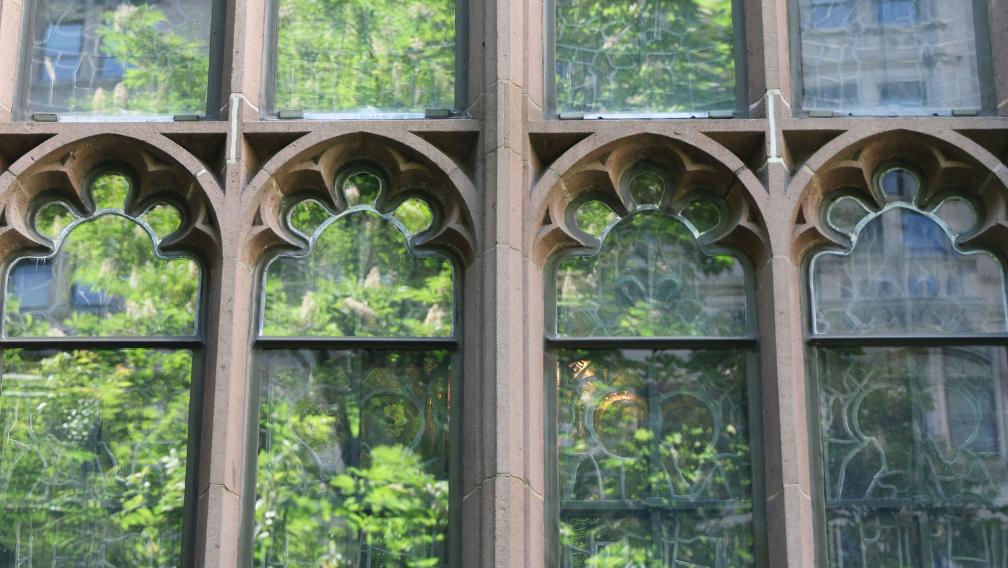Five Ways Into Sunday’s Scripture: The Living Body of Christ

After Jesus had spoken these words, he looked up to heaven and said, “Father, the hour has come; glorify your Son so that the Son may glorify you, since you have given him authority over all people, to give eternal life to all whom you have given him. And this is eternal life, that they may know you, the only true God, and Jesus Christ whom you have sent. I glorified you on earth by finishing the work that you gave me to do. So now, Father, glorify me in your own presence with the glory that I had in your presence before the world existed.
“I have made your name known to those whom you gave me from the world. They were yours, and you gave them to me, and they have kept your word. Now they know that everything you have given me is from you; for the words that you gave to me I have given to them, and they have received them and know in truth that I came from you; and they have believed that you sent me. I am asking on their behalf; I am not asking on behalf of the world, but on behalf of those whom you gave me, because they are yours. All mine are yours, and yours are mine; and I have been glorified in them.
And now I am no longer in the world, but they are in the world, and I am coming to you. Holy Father, protect them in your name that you have given me, so that they may be one, as we are one.”
John 17:1–11
On the seventh and last Sunday of Easter, these verses from the Gospel of John give the reader a window into an intimate conversation between Jesus and his Father, a prayer at the end of Jesus’ ministry of revealing God’s love and mercy in human form. It is the only long, continuous prayer of Jesus among the Gospels, giving a glimpse into the nature and heart of Jesus, as well as his coequality with God. Jesus prays that God be mindful of and protect his followers from a world hostile to the Good News and, by extension, to the church, consecrating the church to be a sign of Christ’s presence in history.
It is the only long, continuous prayer of Jesus among the Gospels, giving a glimpse into the nature and heart of Jesus, as well as his coequality with God.
The circling repetition and interplay of verb tenses (“now I am no longer,” “while I was with them,” “now I am coming to you”) give a sense of suspension between heaven and earth, between the historical Jesus facing death and the glorified Christ of the Resurrection.
At the same time, John seems to spell out the succession of the Spirit of truth from God to Christ, to the apostles, to the church — understood to be the living body of Christ in history.
The phrase in verse 11, “so that they may be one,” has been the inspiration for the Christian ecumenical movement’s ongoing call to unity among the churches. One could read in it an invitation for Christians to transcend dualistic thinking by understanding ourselves to be in Christ, as well as to see Christ abiding in everyone.
—Dr. Kathy Bozzuti-Jones
COMMENTARY
What’s in a name? “They, these nobodies, had just been given a gift that was denied even their revered teacher Moses: the name and person of God.”
“John’s [G]ospel assumes that people were created by God for relationship with God.”
SPIRITUAL PRACTICE
Find a quiet place to pray aloud in the coming week, using this alternate interpretation of Jesus’ farewell discourse: “Try to enter into the mind and heart of Jesus on the night before he died. Allow yourself to taste his love and concern for those he loved.”
VISUAL ART
“First knowing what God wants, and then acting upon it, is what Jesus is prompting us to in today’s reading.” See, here, this idea in counterpoint to the abstract expressionism of Jackson Pollock.
POETRY
From a book of poems entitled The Ninety-Third Name of God: “The Name of God.”
INTERFAITH
On the oneness of the human family.
Coming Soon
This Sunday at 10am, join Discovery for In the Footsteps of Paul and hear from the Trinity Pilgrims back from travels to Greece and Rome.
Over the summer, join the Trinity community for a parishioner-led study of Paul’s letter to the Philippians in Summer Sundays, June 11–August 27.





